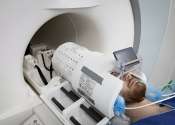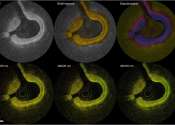Last update:
Radiology & Imaging news
Radiology & Imaging
GPT-4 matches radiologists in detecting errors in radiology reports
Large language model GPT-4 matched the performance of radiologists in detecting errors in radiology reports, according to research published in Radiology.
Apr 16, 2024
0
1
Neuroscience
Research suggests answer to adolescent idiopathic scoliosis may reside in brain's corticoreticular pathway
Heavy school bags, poor posture, one-handed sports are often blamed for the development of curved spine in teens. Known as adolescent idiopathic scoliosis (AIS), it affects those aged 10 to 19 but has no known cause. A team ...
Apr 16, 2024
0
17
World-first microscopic stiffness probe could advance early cancer diagnosis
Researchers at the University of Nottingham have created an endoscopic device that can 3D image the stiffness of individual biological cells and complex organisms, a discovery that could help doctors discover and treat cancer ...
Apr 15, 2024
0
24

AI software could advance voice box cancer treatment
Artificial intelligence has been found to improve the outcome of patients with voice box cancer, which is a step closer to personalized treatment, new research has revealed.
Apr 15, 2024
0
1

Young women often delay looking into breast symptoms, research finds
Young women who find a lump or other potential signs of breast cancer often delay for weeks before finally seeing a doctor, a new study shows.
Apr 12, 2024
0
0

New AI method captures uncertainty in medical images
In biomedicine, segmentation involves annotating pixels from an important structure in a medical image, like an organ or cell. Artificial intelligence models can help clinicians by highlighting pixels that may show signs ...
Apr 11, 2024
0
21

PET/MRI found to accurately classify prostate cancer patients, offer potential to avoid unnecessary biopsies
PET/MRI can improve diagnostic accuracy for prostate cancer patients and help avoid unnecessary biopsies, according to new research published in the Journal of Nuclear Medicine. By applying the PRIMARY scoring system to PET/MRI ...
Apr 11, 2024
0
7

Researchers review use of MRI to identify brain cancer biomarkers
Researchers from the School of Biomedical Engineering & Imaging Sciences (BMEIS) have published a systematic review in Neuro-Oncology Advances exploring the use of MRI imaging techniques to identify non-invasive biomarkers ...
Apr 11, 2024
0
0

Preventive mastectomy less common for black women with breast cancer
Black women with cancer in one breast are less likely than white women to have the healthy breast removed as well, a new study has found.
Apr 11, 2024
0
0

Novel CT exam reduces need for invasive artery treatment
A new study shows that a non-invasive imaging test can help identify patients with coronary artery blockage or narrowing who need a revascularization procedure. The findings were published as a Special Report in Radiology: ...
Apr 11, 2024
0
1

AI-assisted breast-cancer screening may reduce unnecessary testing
Using artificial intelligence (AI) to supplement radiologists' evaluations of mammograms may improve breast-cancer screening by reducing false positives without missing cases of cancer, according to a study by researchers ...
Apr 10, 2024
0
35

Using 3D ultrasound to improve monitoring of dangerous aneurysms
During her doctoral research, Esther Maas investigated the use of new ultrasound techniques to image dangerous aortic aneurysms for patient-specific care.
Apr 10, 2024
0
0

With cancer cases rising in young people, could earlier screenings help save lives?
Cancer cases are increasing among young people, with rising instances of colorectal cancer in people under age 55 and cervical cancer diagnoses ticking up for women ages 33 to 44, according to the American Cancer Society.
Apr 10, 2024
0
0

Shorter scan to diagnose prostate cancer could increase availability and reduce cost
Removing one step from a three-part MRI scan, which could make them quicker, cheaper, and more accessible, had no negative impact on diagnostic accuracy, according to clinical trial results led by UCL and UCLH.
Apr 8, 2024
0
0

An exosome-based liquid biopsy shows promise for early detection of pancreatic cancer
An investigational exosome-based liquid biopsy accurately detected 97% of stage 1-2 pancreatic cancers when combined with the biomarker CA 19-9, according to research presented at the American Association for Cancer Research ...
Apr 8, 2024
0
1

Blood test spots early pancreatic cancers with 97% accuracy
A blood test appears capable of detecting early-stage pancreatic cancers with up to 97% accuracy, a new study reports.
Apr 8, 2024
0
1

Intravascular ultrasound outperforms angiography for peripheral artery disease treatment
One-year success rates from angioplasty procedures to open clogged arteries in the legs were significantly higher among patients whose procedures were guided by intravascular ultrasound (IVUS) alongside angiography compared ...
Apr 8, 2024
0
0

Integration of MRI screening beneficial for prostate cancer
Integrating magnetic resonance imaging (MRI) into prostate cancer (PCa) screening is associated with a reduction in unnecessary biopsies and overdiagnosis of insignificant disease, according to a review published online April ...
Apr 8, 2024
0
1

Magnetic resonance-guided focused ultrasound in intracranial diseases
Magnetic resonance-guided focused ultrasound (MRgFUS) is a non-invasive technique for neuroregulation. It offers several advantages, including being non-invasive, eliminating the need for general anesthesia requirements, ...
Apr 3, 2024
0
0

World's most powerful MRI scans first images of human brain
The world's most powerful MRI scanner has delivered its first images of human brains, reaching a new level of precision that is hoped will shed more light on our mysterious minds—and the illnesses that haunt them.
Apr 2, 2024
0
128













































